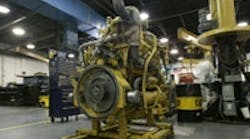As an authorized Caterpillar dealer for heavy equipment and engines in Arizona and Southeastern California, the floors in Empire Southwest’s maintenance bays must be able to withstand powerful impacts and provide a dust-free environment for servicing engines and hydraulic equipment. The facility’s concrete floor was beginning to show considerable wear and its poor condition wasn’t only causing problems for its workers, but also was degrading equipment performance.
“The maintenance bays saw constant use from wheeled vehicles, heavy track and roller equipment and foot and cart traffic,” says Bob Swan, special projects manager, Euclid Chemical (www.euclidchemical.com), a supplier of specialty products and support services for concrete and masonry construction. The facility was using floor coatings, but, “The floors were all chewed up from the traffic and the occasional dropped tools and machinery parts.”
The floor topping lasts as much as eight times as long as concrete with superior abrasion and impact resistance.
Floor joint deterioration also presented problems. Workers were becoming frustrated because they couldn’t easily move carts over the damaged floors without having parts and tools fall off. “The dust from the eroded concrete also posed a problem by potentially contaminating the equipment that was being repaired,” Swan says.
Empire specified BayTop, an epoxy and iron aggregate system from Structural Preservation Systems (SPS, www.structural.net). A floor coating is usually applied only several mils thick, while the BayTop floor topping is placed 3/8-inch thick. At Empire, the floor had worn unevenly so BayTop was used to re-level the surface.
Iron aggregate floor systems can last eight times longer than concrete and offer superior abrasion- and impact-resistance. The highly wear-resistant systems are suitable for equipment maintenance facilities or heavy manufacturing plants where flooring is showing significant wear and tear.
“Iron aggregate flooring is particularly appropriate for an environment in which there’s a lot of foot and wheeled traffic — where workers are moving tools, parts and components on dollies or carts,” explains Jim Andrews, general manager of Delta Pacific, SPS’s heavy-duty flooring division. “High-traffic areas can become eroded and abraded to a surface that would be considered unsafe or unusable by regular traffic patterns of the day.”
BayTop can fill imperfections in the floor and can be placed to provide increased slope for better drainage, an important aspect for handling spills and facilitating cleaning. The result is a smooth, flat floor that not only looks good, but also is highly impact-resistant. Because the iron aggregate within the epoxy doesn’t fracture, it won’t cause dusting.
Iron aggregate flooring isn’t a new concept (iron aggregate floors have been in existence for more than 100 years). SPS has worked with Euclid Chemical to improve the formulation and develop an installation system that makes the flooring more cost-effective.
“Over the years, iron flooring fell out of favor. Although it was very popular at one time, it was also very hard to install correctly, and so cost became a deciding factor for both the installer and the buyer,” Andrews says. “We knew that iron aggregate flooring, with its almost steel-plate-like surface, could be the solution our customers were looking for. We worked with Euclid, modified the chemistry, and developed new technologies to make the flooring work better, be easier to install and more economical.”
The floor can be cleaned and washed with the same sweepers or washing equipment used on any floor surface. “One of the unique features of these floors is that they actually get better with age,” Andrews says. “As the resin or cement wears away with abrasion, the iron metal particles begin to polish, so in high-traffic areas such as aisles or walkways, you begin to see a bit of shine. It’s a nice feature that develops over time.”
Randy Lamb, director of properties and safety at Empire Southwest, was especially pleased with the installation of SPS’s iron flooring system. “We selected this product because of its aesthetics, the durability and the strength of the product, but what also was important to us was the time frame,” Lamb says. “It was installed during a weekend, and so we didn’t have to incur extended downtime in our facility. Our concrete floor was 35 years old, and was in pretty bad shape. The iron flooring provides the high-impact resistance for the type of equipment and use that Empire’s facility handles on a day-to-day basis. We know that we got good value for our money.”
